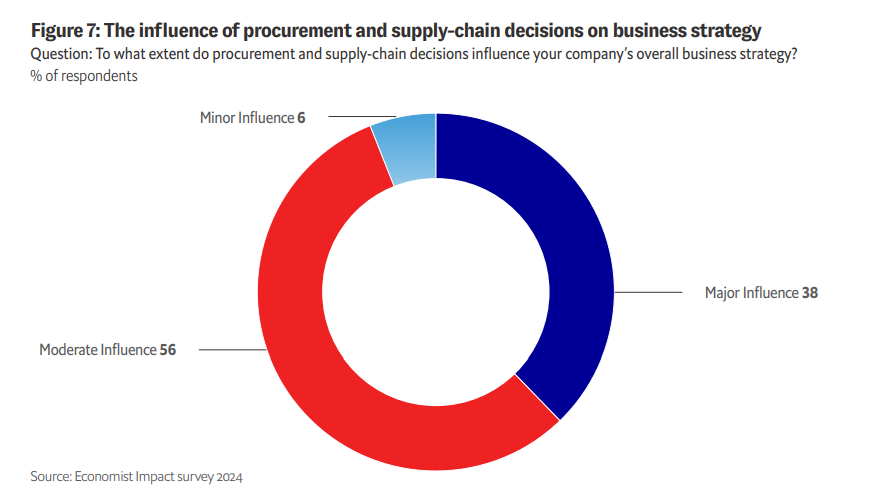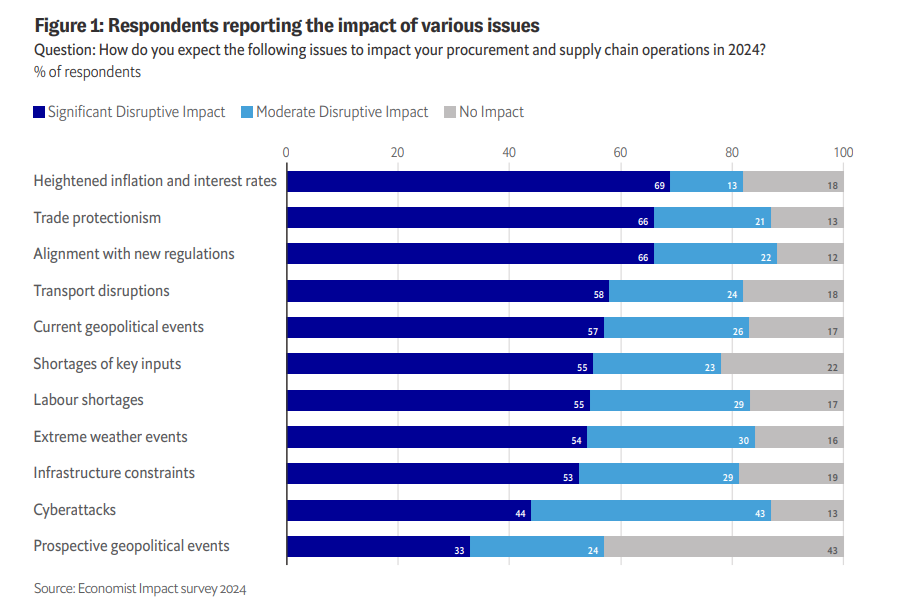
94% of Executives Believe Supply Chain Decisions Influence Business Strategy
- A 2024 Economist Impact survey finds procurement and supply chain executives are considered key to enterprise strategy.
- However, 41% of procurement and supply chain executives are below the C-suite level.
- More emphasis needs to be placed on making the supply chain function a core part of top management.
November 16, 2024 | Supply Chain Strategy
Supply chain executives have become critical to business — as they should — but there still exists room to elevate supply chain leaders to the C-suite level.
According to the 2024 Economist Impact survey commissioned by GEP , 94% of business leaders believe procurement and supply chain decisions have a profound impact on their companies’ business strategies.
However, 41% of companies' most senior supply chain executives are still below the C-suite level.
In the survey conducted between January and March of 2024, 400 executives in the U.S. and Europe familiar with their company’s procurement and supply chain operations participated.

Significant Role of Supply Chain in Company Strategy
According to the Economist Impact survey, nearly 38% of executives view procurement and supply chain decisions as having a major influence on company strategy and 56% of executives see them as having a moderate influence.
Supply chain executives today do much more than saving costs. They are crucial to softening the huge risks inherent in supply chains today — and for adding significant value to the business.
Also read: 57% Companies Looking at AI to Support Supply Chain Decisions: Economist Impact Survey 2024
Dealing with Enterprise Risks
The amount and types of business risks have multiplied over the past several years.
Across all risks, 55% of executives expect significant supply chain disruptions in 2024.
The pandemic exposed the vulnerabilities of fragile supply chains. As factories closed and transport networks faltered, firms lacking control over inputs and logistics quickly hobbled.
Geopolitical tensions compound the challenge. The era of globalized production is giving way to concentrated manufacturing hubs and politically motivated chokepoints. Navigating tariffs, export curbs and investment screening demands mastery of supply chain management. Building supply chain resilience has become a priority. Chief procurement officers and chief supply chain officers have become vital to enterprises as they try to deal with risks.

Also read: Clearing the Path: Overcoming Regulatory Hurdles in Implementing AI-Powered Supply Chains
Adding Value to the Enterprise
CEOs look to supply chain executives to capture value: allocate capital, promote cast flow and contribute to the company’s growth.
Supply chain outlays make up around 55% of a total product cost, according to another study, cited in Business, Management and Education journal.
Since the supply chain has a huge impact on the cost of the final product, it is important to continually improve supply chain processes to reduce the overall cost. Keeping the price competitive helps the company be adaptable and flexible.
According to a Chief Executive magazine article, CEOs expect CPO and CSCOs to provide a strategic perspective on the markets their enterprises deal with and contribute to the major areas that drive value creation: revenue enhancement, cost reductions and capital allocation.
41% of Supply Chain and Procurement Chiefs Below C-suite
However, despite their rising influence, top supply chain professionals still lack C-suite representation at many firms.
According to the Economist Impact study, 41% procurement and supply chain executives do not have a seat among senior leadership — a finding at odds with the new strategic importance supply chain and procurement leaders are being accorded.
Room for Elevating Supply Chain Still Exists
As supply snarls and cross-border tensions persist, companies can ill-afford to ignore the strategic value supply chain leadership brings. The winners will be those empowering procurement teams as equal to finance or technology strategists.
Downplaying supply chain expertise now carries a strategic cost. While we see the positive trend of a vast majority of enterprise leaders believing supply chain and procurement executives play a key role in strategic decisions of the companies, more enterprises should offer supply chain leaders a seat at the table. More emphasis needs to be placed on making the supply chain function a core part of top management.



